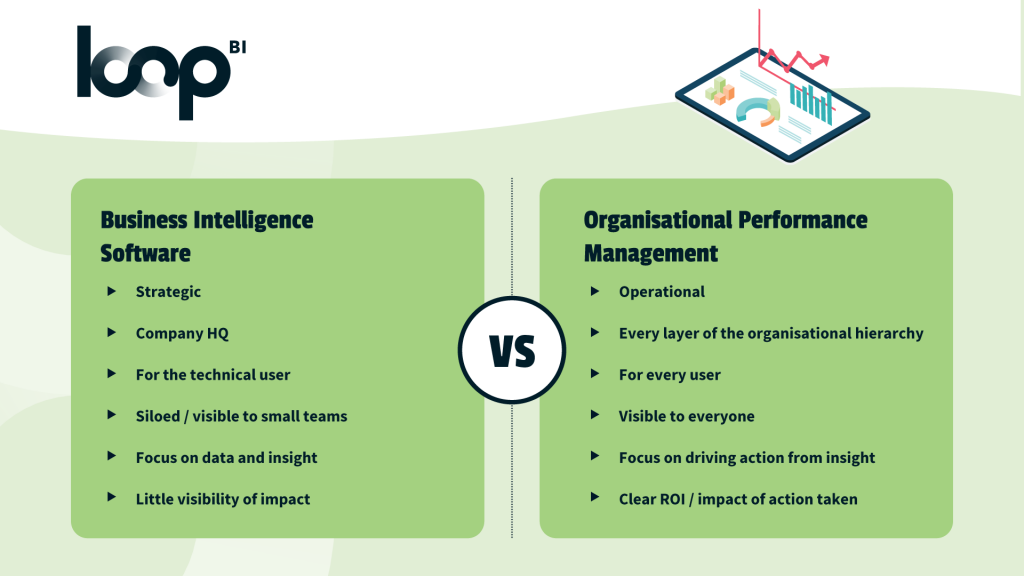Revealed: 9 questions to ask yourself before choosing a business optimisation tool
 Simon Porri
·
4 minute read
Simon Porri
·
4 minute read
Find the right solution for your company by asking these essential questions to ascertain if you need a business intelligence (BI) tool or business performance management (BPM) solution.
On paper at least, both BI and BPM solutions look and sound like a silver bullet for all your data needs. Offering effortless data management with rich micro- and macro-level insights – all available at your fingertips – you pays your money, you transforms your business. Simple.
In reality though, BI and BPM each utilise different functionality and features that need to be understood before taking the plunge. To help you decide, ask yourself – and your potential provider – the following questions to see which solution is the right fit for your operational needs:
1. How accessible do I want my data to be?
Consider who you want to surface your data to and how it might impact on the future success of your business. You may wish to restrict access to your data to siloed teams only – if so, then a BI tool is the right way to go. However, if you want to make your data securely accessible to everyone in your company so you create a shared focal point, that gives everyone visibility of the impact of their actions, then BPM gives you the assignability options you need to make this happen.
2. Are the users I want to engage with technical or ‘noobs’?
If you want to deliver data in a deep-dive format that offers granular detail for technical users only, a BI tool offers the optimum solution. Alternatively, if you wish to make data and insights accessible to non-tech folk – that requires little training to access and decipher – BPM gives you the dashboards and simplified data overviews you need to deliver intuitive user experiences.
3. What do I want my organisation to do with the data?
It’s one thing to surface data to your organisation – but what you do with it is an entirely different challenge. Consider if you want your tool to demonstrate ROI, i.e., how it will show and demonstrate that it’s actually changing behaviours.
BI tools traditionally offer great data insights but limited visibility of ROI for any actions taken based on said insights. It means if demonstrating that return is vital to your operations, BPM’s tracking of insight-driven actions – from operational through to sales and more – are an ideal match, allowing you to quickly and easily judge how successful any action has been.
4. How is my business structured?
Use your business’ hierarchy to inform your optimisation choice. For instance, you may have a relatively small business housed in a single building so a BI tool will likely service all your needs. However, if your organisation has multiple locations spread out across the country or globe, you suddenly have different layers of organisational hierarchy to manage successfully.
This latter set-up introduces serious logistical challenges including, say, assigning data permissions. An BPM solution will enable you to effectively service your company’s complex hierarchy, offering the scalability and assignability you need to deal with any current and future logistical challenges efficiently.

5. How mature is my dataset?
Every company is different. You may store your data in a data warehouse, which is maintained automatically and can be fed into an optimisation solution with minimal effort. Alternatively, your reporting may currently be delivered through a mishmash of Excel spreadsheets that only your accounts person knows how to manipulate.
While BI and BPM solutions can both address either scenario, do consider your own data management aptitude. For instance, if you believe you’ll require extensive support wrangling your data, ensure your potential provider can help during the transition period – or else you could be left with what is known technically as an ‘unmanageable mess’, no matter which solution you decide to deploy.
6. Should my intended solution focus more on strategy or operations?
Decide what you actually want from your optimisation solution. You may wish to conduct deep level analysis of your business’ trends, deploy analytics to uncover vital insights, and introduce machine learning to unearth opportunities. If so, go with a BI tool to manage such strategic insights successfully.
On the other hand, you may require a more operations-focused tool to help drive change across the entire business by optimising performance and workflows. Enter BPM that is designed to offer the operational oversight you need to drive operational transformation.
7. What level of involvement do I want from my provider?
This is another question for your prospective provider and it depends on your specific needs: Are you looking for a plug-and-play solution that you can buy off the shelf and manage in-house? Or do you need a partner who can go the extra mile?
In other words, one that advises you on how to get the maximum impact from your investment – whether BI or BPM – understands your unique needs and keeps the system in line with your objectives. Doing homework on your potential provider now means you benefit from a solution that meets your needs from day one, not 101.
8. Have I considered ongoing support and maintenance?
When choosing a provider, check they have experience of onboarding businesses like yours and can offer a proven track record – with testimonials – from similar customers. Also ask yourself how you are going to roll out the solution and train your people to use it. Consider too whether you have the resources to manage this process in-house, plus
identify who is going to actually integrate your data and KPIs. Finally, analyse how you are going to keep your data updated and provide support to your user base on a rolling basis.
9. Do I need a customisable solution?
The chances are you’ll need some level of customisation. This means your intended Business Intelligence or Business Performance Management solution must be able to scale and flex with the requirements of your business as it grows. Your provider should provide evidence that its solution is flexible, easy to update and responsive. If not, whatever solution you do choose risks becoming a damp squib rather than a silver bullet.
Right questions, right answers – is business performance management for you?
Securing honest answers to all nine questions puts you in the best possible position to choose the right solution for your specific needs. Such assurance is not only a vital part of growing your business but also safeguarding it – and your bottom lines – as you move forward in these increasingly unpredictable times.
Whether you’re going with a traditional BI tool to be used by analysts in head office, such as Tableau or Power BI, or you want to optimise performance across your entire organisation with a Business Performance Management solution like Loop, the right provider will understand and respect any queries. Importantly, they should be keen to offer a transparent service able to meet your unique needs so you both thrive in future.




